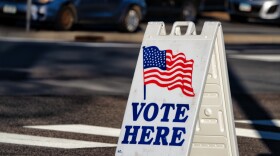Kentucky’s primary was moved to June 23 from its original date on May 19 due to safety concerns related to the coronavirus pandemic. For the primary, the state has also expanded to all registered voters the option of absentee voting, which was previously only allowed for a few reasons, such as military deployment, disability, or temporary residence out of the state.
Because many residents will be voting by mail, it’s important to remember ballots must be received by county clerks by the time polls close at 6:00 p.m. local time on Election Day.
So, just to be clear, that means you must mail (or hand deliver) your ballot in time for it to arrive in the county clerk’s office by 6:00 p.m. local time on June 23 for the ballot to be counted.
Here are a few things you should know about mailing in your ballot.

You must request an absentee ballot. The state will mail a postcard to all registered voters with absentee voting information.
Registration for the primary election ended May 26, but Kentuckians have until June 15 to request an absentee ballot.
Once you receive the ballot, carefully read and follow the instructions.
Sign and date where indicated.
Mail your voted ballot back to the address indicated on the return envelope.
Your voted ballot must arrive by the deadline. The state is paying for postage.
However, Kentucky’s primary election is not a mail-only election.
Do I have to vote by absentee ballot?
No, there are four ways to vote in the upcoming primary.
- Absentee by mail
- Hand-delivery of absentee ballot
- Vote early in-person (appointment with county clerk recommended)
- Vote on election day in-person (appointment with county clerk recommended)
The Kentucky State Board of Elections has also approved drop off locations for absentee ballots in courthouses designated by county clerks.
You can find your polling place here.

What are the deadlines?
Kentuckians have until June 15 to request an absentee ballot.
Registration for the June 23 Kentucky primary election has passed. However, you can still register to vote in the November 3 general election until October 5.
What if I or my spouse has a medical emergency?
Each person can request an absentee paper ballot, following the county clerk’s receipt of the notarized form SBE 45, Medical Emergency Application for an Absentee Ballot, and must apply within 14 days of an election.
Where can I check to see if I’m registered?
You can check your voter registration at the Kentucky State Board of Elections’ website.

If you weren’t able to register to vote by May 26 for the June 23 primary election, you can still register to vote in the general election on November 3. The deadline for registering to vote in the general election is October 5.
In order to register to vote you have to meet a few eligibility requirements:
- Be a U.S. Citizen
- A current resident of Kentucky
- Be at least 18 years of age on or before the next general election.
- Not be a convicted felon; or if you have been convicted of a felony you have to have your right to vote restored by expungement, Executive Pardon, or Executive Order.
- Have not been judged “mentally incompetent” in a court of law.
- Not claim the right to vote anywhere outside Kentucky.
You also have to provide some identification information.
- Social Security number
- Date of birth
If I have a felony on my record can I vote?
Until late last year, Kentucky was among a handful of states that permanently banned people with felony records from voting. In his first week in office, Gov. Andy Beshear issued an executive order automatically restoring voting rights to an estimated 140,000 people convicted of felonies who have completed their sentences. Beshear also launched a website where people can check their eligibility to vote.
Kentuckians convicted of the felonies listed below do not receive automatic restoration of their right to vote or hold public office:
- Treason
- Bribery in an election
- A violent offense
- Any murder offense as defined by the state.
- Any assault, as listed and defined here
- Strangulation in the first degree
- Human trafficking
- Any felony conviction in another state or in the federal system.
Are mail-in ballots a secure way to vote?
Election experts say voter fraud among any type of voting, including mail-in ballot, is extremely rare. According to NPR, mail-in ballots accounted for 1 in 4 votes in 2018 and are increasing in popularity.
And the idea has bipartisan support. Mail-in ballots are used in Republican-friendly states such as Florida, Arizona and Utah. Former Democratic presidential candidate Sen. Elizabeth Warren has proposed that a mail-in ballot be sent to every voter in the country.
For a look at how states are handling voting during a pandemic, see this chart from the Brennan Center.





